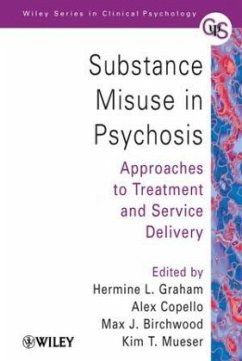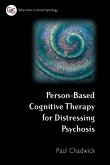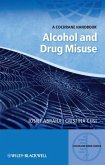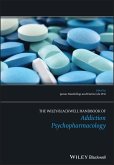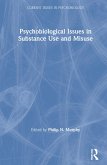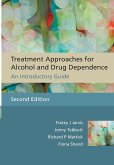Substance Misuse in Psychosis
Approaches to Treatment and Service Delivery
Herausgegeben:Graham, Hermine L.; Copello, Alex; Birchwood, Max J.; Mueser, Kim T.
Substance Misuse in Psychosis
Approaches to Treatment and Service Delivery
Herausgegeben:Graham, Hermine L.; Copello, Alex; Birchwood, Max J.; Mueser, Kim T.
- Broschiertes Buch
- Merkliste
- Auf die Merkliste
- Bewerten Bewerten
- Teilen
- Produkt teilen
- Produkterinnerung
- Produkterinnerung
The prevalence of substance abuse in the severely mentally ill is higher than that in the general population, making this a serious issue for clinicians. Integrated treatment, although the most widely adopted approach, is subject to tremendous variation in its operationalisation, especially throughout different parts of the world.
Substance Misuse in Psychosis presents the latest international developments and practical treatment interventions that can be used with co-morbid individuals and their families. Different social and cultural contexts are described and contrasted, along with…mehr
![Person-Based Cognitive Therapy for Distressing Psychosis Person-Based Cognitive Therapy for Distressing Psychosis]() Paul ChadwickPerson-Based Cognitive Therapy for Distressing Psychosis88,99 €
Paul ChadwickPerson-Based Cognitive Therapy for Distressing Psychosis88,99 €![Alcohol and Drug Misuse Alcohol and Drug Misuse]() Iosief AbrahaAlcohol and Drug Misuse65,99 €
Iosief AbrahaAlcohol and Drug Misuse65,99 €![Treating Adult Substance Abuse Using Family Behavior Therapy Treating Adult Substance Abuse Using Family Behavior Therapy]() Brad DonohueTreating Adult Substance Abuse Using Family Behavior Therapy69,99 €
Brad DonohueTreating Adult Substance Abuse Using Family Behavior Therapy69,99 €![The Wiley-Blackwell Handbook of Addiction Psychopharmacology The Wiley-Blackwell Handbook of Addiction Psychopharmacology]() James MacKillopThe Wiley-Blackwell Handbook of Addiction Psychopharmacology69,99 €
James MacKillopThe Wiley-Blackwell Handbook of Addiction Psychopharmacology69,99 €![Psychobiological Issues in Substance Use and Misuse Psychobiological Issues in Substance Use and Misuse]() Psychobiological Issues in Substance Use and Misuse179,99 €
Psychobiological Issues in Substance Use and Misuse179,99 €![Treatment Approaches for Alcohol and Drug Dependence Treatment Approaches for Alcohol and Drug Dependence]() Tracey J JarvisTreatment Approaches for Alcohol and Drug Dependence94,99 €
Tracey J JarvisTreatment Approaches for Alcohol and Drug Dependence94,99 €![The Addiction Counselor's Desk Reference The Addiction Counselor's Desk Reference]() Robert Holman CoombsThe Addiction Counselor's Desk Reference84,99 €
Robert Holman CoombsThe Addiction Counselor's Desk Reference84,99 €-
-
-
Substance Misuse in Psychosis presents the latest international developments and practical treatment interventions that can be used with co-morbid individuals and their families. Different social and cultural contexts are described and contrasted, along with treatment approaches that have been tailored to address the needs of the severely mentally ill. A final section considers sub-groups, e.g. the young, the homeless, outlining the special issues that need to be considered when providing services for these groups.
- Produktdetails
- Wiley Series in Clinical Psychology
- Verlag: Wiley & Sons
- 1. Auflage
- Seitenzahl: 424
- Erscheinungstermin: 10. Juli 2007
- Englisch
- Abmessung: 225mm x 154mm x 24mm
- Gewicht: 590g
- ISBN-13: 9780470013618
- ISBN-10: 0470013613
- Artikelnr.: 13906198
- Wiley Series in Clinical Psychology
- Verlag: Wiley & Sons
- 1. Auflage
- Seitenzahl: 424
- Erscheinungstermin: 10. Juli 2007
- Englisch
- Abmessung: 225mm x 154mm x 24mm
- Gewicht: 590g
- ISBN-13: 9780470013618
- ISBN-10: 0470013613
- Artikelnr.: 13906198
Social and Psychological Perspectives of Problem Substance Use Among those
with Psychosis. Introduction (Max J. Birchwood). Chapter 1: Substance
Misuse in Psychosis: Contextual Issues (Jenny Maslin). Chapter 2: Temporal
Order and Aetiology(Martin Hambrecht and Heinz H¿afner). Chapter 3:
Substance Misuse and Psychosis in Context: The Influences of Families and
Social Networks (Alex Copello). Chapter 4: Sociological Aspects of
Substance Misuse among People with Severe Mental Illness (Martin J.
Commander). Chapter 5: A Cognitive Conceptualization of Concurrent
Psychosis and Problem Drug and Alcohol Use (Hermine L. Graham). Part II:
Integrated Service Delivery Models. Introduction (Kim T. Mueser). Chapter
6: Integrated Dual Disorder Treatment in New Hampshire (USA) (Kim T. Mueser
and Robert E. Drake). Chapter 7: The Combined Psychosis and Substance Use
(COMPASS) Programme: An Integrated Shared-care Approach (Hermine L. Graham,
Alex Copello, Max J. Birchwood, Jenny Maslin, Dermot McGovern, Jim Orford
and George Georgiou). Chapter 8: An Integrated Treatment Approach to
Substance use in an Early Psychosis Programme (Jean Addington). Chapter 9:
An Inpatient-Based Service Model(Richard N. Rosenthal). Part III:
Treatments for Substance Misuse in Psychosis. Introduction (Alex Copello).
Chapter 10: Assessment Considerations (Douglas L. Noordsy, Debra V. McQuade
and Kim T. Mueser). Chapter 11: Cognitive-Behavioural Integrated Treatment
Approach for Psychosis and Problem Substance Use (Hermine L. Graham, Alex
Copello, Max J. Birchwood, Jim Orford, Dermot McGovern, Jenny Maslin and
George Georgiou). Chapter 12: Relapse Prevention for Patients with Bipolar
and Substance Use Disorders (Roger D. Weiss, Shelly F. Greenfield and Grace
O'Leary). Chapter 13: Family Intervention for Substance Misuse in Psychosis
(Christine Barrowclough). Chapter 14: Start Over and Survive: A Brief
Intervention for Substance Misuse in Early Psychosis (David J. Kavanagh,
Ross Young, Angela White, John B. Saunders, Natalie Shockley, Jeff Wallis
and Anne Clair). Chapter 15: Pharmacological Management of Substance Misuse
in Psychosis (Ed Day, George Georgiou and Ilana Crome). Part IV: Special
Populations. Introduction (Hermine L. Graham). Chapter 16: Cannabis and
First-Episode Psychosis: The CAP Project (Jane Edwards, Mark Hinton,
Kathryn Elkins and Olympia Athanasopoulos). Chapter 17: Comorbid severe
Mental Health Problems and Substance Abuse in Forensic Populations (Alison
Beck, Tom Burns and Tim Hunt). Chapter 18: Integrated Treatment Outcomes
for Homeless Persons with Severe Mental Illness and Co-Occurring Substance
Use Disorders (Susan A. Pickett-Schenk, Michael Banghart and Judith A.
Cook). Chapter 19: Issues in Comorbidity and HIV/AIDS (Lisa Razzano). Part
V: The Evolving Evidence Base. Chapter 20: Cochrane Review of Treatment
Outcome Studies and its Implications for Future Developments (Ann Ley and
David Jeffery). Epilogue: Future Directions. Concluding Remarks (Hermine L.
Graham, Alex Copello, Max J. Birchwood and Kim T. Mueser). Index.
Social and Psychological Perspectives of Problem Substance Use Among those
with Psychosis. Introduction (Max J. Birchwood). Chapter 1: Substance
Misuse in Psychosis: Contextual Issues (Jenny Maslin). Chapter 2: Temporal
Order and Aetiology(Martin Hambrecht and Heinz H¿afner). Chapter 3:
Substance Misuse and Psychosis in Context: The Influences of Families and
Social Networks (Alex Copello). Chapter 4: Sociological Aspects of
Substance Misuse among People with Severe Mental Illness (Martin J.
Commander). Chapter 5: A Cognitive Conceptualization of Concurrent
Psychosis and Problem Drug and Alcohol Use (Hermine L. Graham). Part II:
Integrated Service Delivery Models. Introduction (Kim T. Mueser). Chapter
6: Integrated Dual Disorder Treatment in New Hampshire (USA) (Kim T. Mueser
and Robert E. Drake). Chapter 7: The Combined Psychosis and Substance Use
(COMPASS) Programme: An Integrated Shared-care Approach (Hermine L. Graham,
Alex Copello, Max J. Birchwood, Jenny Maslin, Dermot McGovern, Jim Orford
and George Georgiou). Chapter 8: An Integrated Treatment Approach to
Substance use in an Early Psychosis Programme (Jean Addington). Chapter 9:
An Inpatient-Based Service Model(Richard N. Rosenthal). Part III:
Treatments for Substance Misuse in Psychosis. Introduction (Alex Copello).
Chapter 10: Assessment Considerations (Douglas L. Noordsy, Debra V. McQuade
and Kim T. Mueser). Chapter 11: Cognitive-Behavioural Integrated Treatment
Approach for Psychosis and Problem Substance Use (Hermine L. Graham, Alex
Copello, Max J. Birchwood, Jim Orford, Dermot McGovern, Jenny Maslin and
George Georgiou). Chapter 12: Relapse Prevention for Patients with Bipolar
and Substance Use Disorders (Roger D. Weiss, Shelly F. Greenfield and Grace
O'Leary). Chapter 13: Family Intervention for Substance Misuse in Psychosis
(Christine Barrowclough). Chapter 14: Start Over and Survive: A Brief
Intervention for Substance Misuse in Early Psychosis (David J. Kavanagh,
Ross Young, Angela White, John B. Saunders, Natalie Shockley, Jeff Wallis
and Anne Clair). Chapter 15: Pharmacological Management of Substance Misuse
in Psychosis (Ed Day, George Georgiou and Ilana Crome). Part IV: Special
Populations. Introduction (Hermine L. Graham). Chapter 16: Cannabis and
First-Episode Psychosis: The CAP Project (Jane Edwards, Mark Hinton,
Kathryn Elkins and Olympia Athanasopoulos). Chapter 17: Comorbid severe
Mental Health Problems and Substance Abuse in Forensic Populations (Alison
Beck, Tom Burns and Tim Hunt). Chapter 18: Integrated Treatment Outcomes
for Homeless Persons with Severe Mental Illness and Co-Occurring Substance
Use Disorders (Susan A. Pickett-Schenk, Michael Banghart and Judith A.
Cook). Chapter 19: Issues in Comorbidity and HIV/AIDS (Lisa Razzano). Part
V: The Evolving Evidence Base. Chapter 20: Cochrane Review of Treatment
Outcome Studies and its Implications for Future Developments (Ann Ley and
David Jeffery). Epilogue: Future Directions. Concluding Remarks (Hermine L.
Graham, Alex Copello, Max J. Birchwood and Kim T. Mueser). Index.

